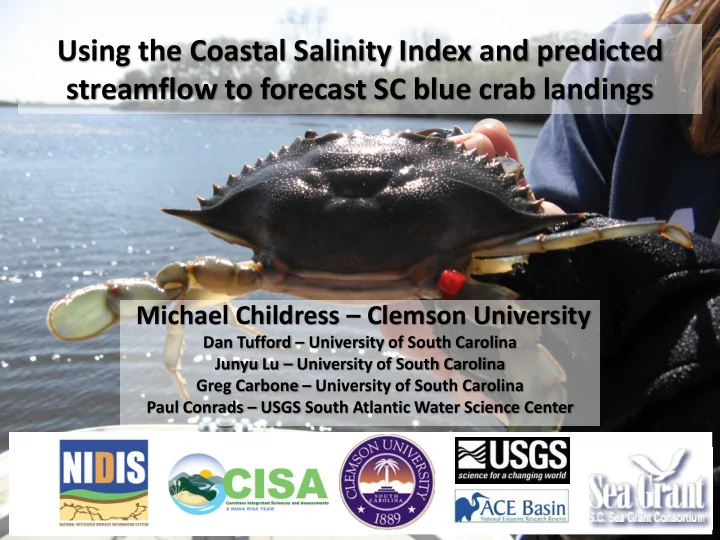

Using the Coastal Salinity Index and predicted streamflow to forecast SC blue crab landings Michael Childress – Clemson University Dan Tufford – University of South Carolina Junyu Lu – University of South Carolina Greg Carbone – University of South Carolina Paul Conrads – USGS South Atlantic Water Science Center
Year lag = 0 r 2 = 0.089 p = 0.048 Childress 2010 SCWRC
Year lag = 1 r 2 = 0.108 p = 0.026 Childress 2010 SCWRC
Year lag = 2 r 2 = 0.177 p = 0.005 Childress 2010 SCWRC
Year lag = 3 r 2 = 0.217 p = 0.002 Childress 2010 SCWRC
Normal Conditions Drought Conditions Salinity
Questions • How does drought impact blue crabs? • Can we forecast future droughts? • Can we use drought forecasts to predict crab landings in South Carolina? • Can we use the Coastal Salinity Index to forecast US blue crab landings?
Questions • How does drought impact blue crabs? • Can we forecast future droughts? • Can we use drought forecasts to predict crab landings in South Carolina? • Can we use the Coastal Salinity Index to forecast US blue crab landings?
Fishery Boundary ACE Basin NERR Childress and Parmenter 2012 SCWRC
Water Quality Disease Crab Density Predation
40 20% Salinity Disease 18% 35 16% Disease Prevalence (%) 30 Median Salinity (psu) 14% 25 12% 20 Ashepoo 10% Ashepoo 8% Combahee Combahee 15 6% Edisto Edisto 10 4% 5 2% 0 0% 1 2 3 4 5 6 7 8 9 1 2 3 4 5 6 7 8 9 Station Station 450 80% Crab Abundance Predation 400 70% 350 60% Juvenile Eaten (%) 300 Crab Number 50% 250 Ashepoo 40% Ashepoo 200 Combahee Combahee 30% 150 Edisto Edisto 20% 100 10% 50 0 0% 1 2 3 4 5 6 7 8 9 1 2 3 4 5 6 7 8 9 Station Station Childress and Parmenter 2012 SCWRC
250 Crab Forecast 200 Crab Number 150 Ashepoo 100 Combahee Edisto 50 Observed ARIMA Forecast 0 J S DM J S DM J S DM J S DM J S DM J S DM J S DM Month (quarterly) Childress and Parmenter 2012 SCWRC
Drought Negative interaction Positive interaction Inflow pH Salinity Temperature Oxygen Settlement Survival Predation Disease Abundance Fish Effort Landings Childress 2014 SCWRC
SCBCRABS Individual Based Model Childress 2014 SCWRC
Questions • How does drought impact blue crabs? • Can we forecast future droughts? • Can we use drought forecasts to predict crab landings in South Carolina? • Can we use the Coastal Salinity Index to forecast US blue crab landings?
Drought Forecasting IPCC 2013
Drought Forecasting Precipitation Evaporation P-E Seager et al. 2009 J Climate
Edisto River OpenNSPECT Model • Nonpoint Source Pollution and Erosion Comparison Tool – GIS-based – Estimates surface runoff – Land use from C-CAP – Soils from NRCS – Precipitation from GCMs (KMNI) using CMIP 5 – Monthly precipitation from 2011-2030 Tufford, Carbone, Lu AWRA 2015
Edisto River OpenNSPECT Model Tufford, Carbone, Lu AWRA 2015
Questions • How does drought impact blue crabs? • Can we forecast future droughts? • Can we use drought forecasts to predict crab landings in South Carolina? • Can we use the Coastal Salinity Index to forecast US blue crab landings?
SCBCRABS Flow Input USGS station 02175000
SCBCRABS Landings Output
SCBCRABS Landings Output
Questions • How does drought impact blue crabs? • Can we forecast future droughts? • Can we use drought forecasts to predict crab landings in South Carolina? • Can we use the Coastal Salinity Index to forecast US blue crab landings?
Coastal Salinity Index (CSI) Conrads USGS SAWSC http://sc.water.usgs.gov/drought/coastal-drought/figures-large/Figure3.png
Coastal Salinity Index (CSI) Conrads USGS SAWSC http://sc.water.usgs.gov/drought/coastal-drought/figures-large/Figure5.png
Coastal Salinity Index (CSI) Waccamaw River Little Back River
Coastal Salinity Index (CSI) Year lag = 0 r 2 = -0.007 p = 0.367 r 2 = 0.138 p = 0.059
Coastal Salinity Index (CSI) Year lag = 1 r 2 = 0.031 p = 0.218 r 2 = 0.183 p = 0.034
Coastal Salinity Index (CSI) Year lag = 2 r 2 = 0.022 p = 0.247 r 2 = 0.304 p = 0.006
Coastal Salinity Index (CSI) Year lag = 3 r 2 = 0.157 p = 0.051 r 2 = 0.386 p = 0.002
Coastal Salinity Index (CSI) Year lag = 3 r 2 = 0.386 p = 0.002 Landings = CSI t-3 * 0.6989 + 4.845
CSI Predicts SC Crab Landings
Coastal Salinity Index (CSI) Landings (million lbs) = 0.6989 * CSI t-3 + 4.8451 SC Landings 2016 = 5.25 (4.73-5.72) Colton et al. 2013 Fisheries & Oceanography
Conclusions • How does drought impact blue crabs? – Increases disease and metabolic costs of migration • Can we forecast future droughts? – Not specifically, but high degree of future occurrence • Can we use drought forecasts to predict crab landings in South Carolina? – Yes, IBM model can forecast landings trends • Can we use the Coastal Salinity Index to forecast US blue crab landings? – Yes, allows for extrapolation to other estuaries
Acknowledgements • Funding – NOAA-UCAR Subaward Z14-15056 – SC Sea Grant R/CF-10 & R/CF-15 – NERR Graduate Research Fellowship – Clemson Research Incentive Fund • Collaboration – Clemson – M Ptacek – ACE Basin NERR – A Segars, J Leffler – SC DNR – D Whittaker, L DeLancey, A Fowler – CISA – D Tufford, G Carbone, J Lu – USGS – P Conrads • Field assistants – K Parmenter – K Smith – Conservation of Marine Resources Team
Questions?
Recommend
More recommend